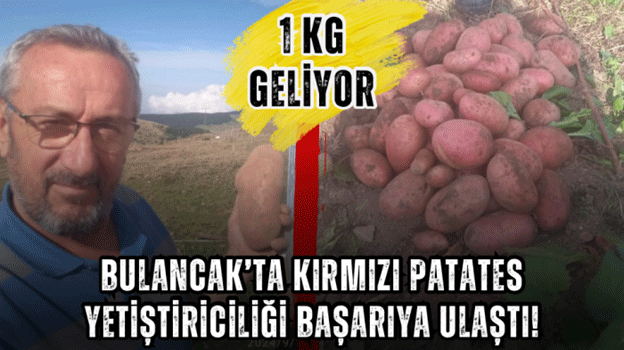Farmers in Giresun, Turkey, have long relied on traditional crops to sustain their agricultural practices. However, a recent project initiated by the Giresun Provincial Directorate of Agriculture and Forestry is changing this dynamic. In an effort to diversify crop production and boost farmers’ incomes, red sweet potatoes were introduced as a trial in various districts, including Bulancak. This article explores the results of these trials, the benefits of red sweet potatoes, and their potential impact on local agriculture.
Red Sweet Potatoes: An Introduction
Red sweet potatoes (Ipomoea batatas), often confused with regular potatoes, belong to the morning glory family and are native to Central America. Though they are distant relatives of traditional potatoes, they offer unique qualities that make them valuable to both farmers and consumers. Red sweet potatoes are known for their resilience, as they can thrive in a variety of soil conditions and are resistant to pests and weeds. This hardy crop produces tubers below the soil while also offering edible young leaves and shoots.
Globally, red sweet potatoes are grown for their high yield, nutritional value, and ability to withstand adverse growing conditions. In parts of Asia, the crop gained popularity during times of natural disasters and food shortages, providing a reliable source of carbohydrates and vitamins when other crops failed. Today, it is still widely cultivated in these regions due to its nutritional benefits and versatility.
Results from Bulancak and Giresun
The Giresun Provincial Directorate of Agriculture and Forestry began experimental planting of red sweet potatoes in 2023 to determine their adaptability to local soil and climate conditions. Farmers in Bulancak, as well as in the districts of Dereli and Alucra, participated in the trial, planting a total of 12,000 seedlings under the supervision of agricultural experts.
The initial results have been highly promising. In Bulancak’s Döngeri Village, where some of the first trials took place, farmers reported a strong resistance to common pests and weeds, as well as favorable growing conditions. Thanks to its robust nature, the crop has quickly adapted to the region’s climate, yielding higher-than-expected results. The demonstration projects in other districts also suggest that red sweet potatoes could become a valuable addition to the region’s crop portfolio.
Nutritional Benefits and Market Potential
Red sweet potatoes offer a variety of health benefits, making them an attractive option for both local consumption and broader markets. They are an excellent source of dietary fiber, vitamins A, C, B, and B6, and essential minerals such as phosphorus, copper, manganese, and potassium. Unlike traditional white potatoes, red sweet potatoes have a low glycemic index, meaning they provide a slow release of energy, making them ideal for maintaining steady blood sugar levels and preventing sudden hunger. The high beta-carotene content supports immune function, while the fibrous nature of the tuber aids in digestion.
Given the global shift towards healthier eating habits, red sweet potatoes have significant market potential. Their nutritional benefits and low calorie content make them popular among health-conscious consumers. In markets across Europe and Asia, demand for red sweet potatoes is growing rapidly, providing an opportunity for Turkish farmers to capitalize on both domestic and export markets.
Challenges and Future Potential
Despite the initial success, the widespread adoption of red sweet potatoes in Giresun faces some challenges. Farmers will need continued support in terms of technical guidance and infrastructure, particularly regarding storage and transportation, to ensure the long-term success of this crop. Additionally, raising awareness among consumers about the nutritional benefits and culinary uses of red sweet potatoes will be essential in driving demand.
However, with the right support, red sweet potatoes could significantly enhance agricultural diversification in Giresun. The region, already known for its hazelnut production, could benefit from the introduction of alternative crops that offer both economic and nutritional advantages. The Giresun Provincial Directorate of Agriculture and Forestry is committed to expanding the cultivation of red sweet potatoes and exploring their full potential in the coming years.
The successful trials of red sweet potatoes in Bulancak and surrounding districts highlight the crop’s potential to transform local agriculture in Giresun. With its high yield, resilience, and significant nutritional benefits, red sweet potatoes offer a sustainable and profitable alternative for farmers. By diversifying crop production, farmers in the region can increase their income and contribute to improved food security. Continued efforts to promote and expand red sweet potato farming will help ensure its lasting impact on both the agricultural landscape and local communities.







